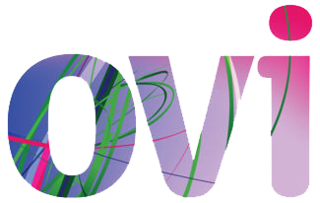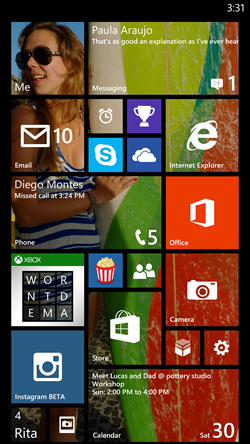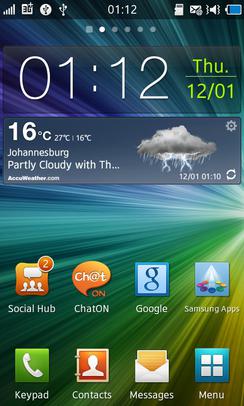Related Research Articles

The S60 Platform was a software platform for smartphones that runs on top of the Symbian operating system. It was created by Nokia based on the 'Pearl' user interface from Symbian Ltd. It was introduced at COMDEX in November 2001 and first shipped with the Nokia 7650 smartphone. The platform has since seen 5 updated editions. Series 60 was renamed to S60 in November 2005.
Keek was a free online social networking service that allowed its users to upload video status updates, which were called "keeks". Users could post keeks to the Keek website using a webcam or via the Keek mobile apps for iPhone, Windows Phone, BlackBerry, or Android. Users could also reply back with text or video comments, known as "keekbacks", and share content to other major social media networks. There was also an embed option so users could embed their keeks into a blog or website.

VK, known as VK Group until 12 October 2021, is a Russian technology company. It started in 1998 as the parent company of Mail.ru, an e-mail service and went on to become a major corporate figure in the Russian-speaking segment of the Internet.
Android is a mobile operating system based on a modified version of the Linux kernel and other open-source software, designed primarily for touchscreen mobile devices such as smartphones and tablets. Android is developed by a consortium of developers known as the Open Handset Alliance, though its most widely used version is primarily developed by Google. It was unveiled in November 2007, with the first commercial Android device, the HTC Dream, being launched in September 2008.

Ovi by Nokia was the brand for Nokia's Internet services. The Ovi services could be used from a mobile device, computer or via the web. Nokia focused on five key service areas: Games, Maps, Media, Messaging and Music. Nokia's aim with Ovi was to include third party developers, such as operators and third-party services like Yahoo's Flickr photo site. With the announcement of Ovi Maps Player API, Nokia started to evolve their services into a platform, enabling third parties to make use of Nokia's Ovi services.

Windows Phone (WP) is a discontinued mobile operating system developed by Microsoft for smartphones as the replacement successor to Windows Mobile and Zune. Windows Phone featured a new user interface derived from the Metro design language. Unlike Windows Mobile, it was primarily aimed at the consumer market rather than the enterprise market.
Windows Marketplace for Mobile was a service by Microsoft for its Windows Mobile platform that allowed users to browse and download applications that had been developed by third parties. The service was available for use directly on Windows Mobile 6.x devices and on personal computers. It was announced at the 2009 Mobile World Congress, and began operation on 6 October 2009, featuring an initial 246 applications. Initially it was available only for Windows Mobile 6.5, and was made available to older 6.x versions a few weeks later. On February 15, 2010, Microsoft announced its next generation mobile platform named Windows Phone; there is a separate app store, Windows Phone Store, for it; WM6.x apps are not compatible with WP7.
BlackBerry World was an application distribution service by BlackBerry Limited. The service provided BlackBerry users with an environment to browse, download, and update mobile apps, including third-party applications.

Tapulous, Inc. was an American software and video game developer and publisher headquartered in Palo Alto, California. It was a wholly owned subsidiary of The Walt Disney Company as part of Disney Interactive's Disney Mobile unit. The company's most profitable products were the Tap Tap series of music games, which surpassed thirty-five million downloads.

Bada is a discontinued mobile operating system developed by Samsung Electronics for devices such as mid- to high-end smartphones and tablet computers. The name is derived from "바다 (bada)", meaning "ocean" or "sea" in Korean. All phones running Bada were branded with the name Wave, unlike Samsung's Android devices which are branded as Galaxy.

GetJar is an independent mobile phone app store founded in Lithuania in 2004, with offices in Vilnius, Lithuania and San Mateo, California.
MiKandi is a defunct mobile adult software applications store. Developed by MiKandi LLC, a formerly Seattle-based company, MiKandi was the world's first mobile porn app store. The store sought to get around restrictions placed on adult content by Apple Inc. by releasing the third-party application store on Google's Android open-source operating system and offering an HTML5 web-based application for all touch devices.
An app store, also called an app marketplace or app catalog, is a type of digital distribution platform for computer software called applications, often in a mobile context. Apps provide a specific set of functions which, by definition, do not include the running of the computer itself. Complex software designed for use on a personal computer, for example, may have a related app designed for use on a mobile device. Today apps are normally designed to run on a specific operating system—such as the contemporary iOS, macOS, Windows, Linux or Android—but in the past mobile carriers had their own portals for apps and related media content.
A mobile application or app is a computer program or software application designed to run on a mobile device such as a phone, tablet, or watch. Mobile applications often stand in contrast to desktop applications which are designed to run on desktop computers, and web applications which run in mobile web browsers rather than directly on the mobile device.

AliOS is a Linux distribution developed by Alibaba Cloud, a subsidiary of Mainland Chinese company Alibaba Group. It is designed for smart cars and Internet of Things (IoT) devices, and it had been used as a mobile operating system.

Dmitry Grishin is a businessman, investor and Internet entrepreneur. He is best known as the co-founder and former Chairman and CEO of Mail.ru Group. Grishin also made significant contributions to Russia's internet presence, Runet, in its early days.
Opera Mobile Store was a platform-independent browser-based app store for mobile-phone owners and a digital application distribution platform used by more than 40,000 developers. It is owned and maintained by Opera. Launched by a third-party provider in March 2011, the Opera Mobile Store was relaunched on a new platform, after acquisition of Handster, a mobile app store platform company, in January 2012. The service allows users to browse and download applications for over 7,500 different devices on Android, Java, BlackBerry OS, Symbian, iOS, and Windows Mobile.
The video game industry is a relatively young sector in Nigeria. As of 2015, the video game development sector is still very small in the country, with only half a dozen young companies creating games. However, in part due to the country's fast growing mobile market and its young population, video games are rapidly growing in popularity.

Cafe Bazaar is an Iranian app store for the Android operating system, founded in April 2011 by Reza Mohammadi and Hessam Armandehi. Cafe Bazaar tailors its services specifically towards Persian-speaking users and offers more than 25,000 downloadable Iranian and international apps for gaming, social media, messaging and other uses.
References
- ↑ Wagstaff, Keith (January 4, 2012). "Robots Get Their Own App Store". Time .
- ↑ Hornyak, Tim (January 4, 2012). "Finally, an app store for robotkind". CNET.com.
- ↑ "The Robot App Store Will Fulfill Your Fantasy of Owning a Beer-Serving Bot". Fast Company. 17 November 2011.
- ↑ "Developer Revenues".
- ↑ "Robotics App Store Launched". Robotics Trends. 2011-08-28.
- ↑ "New Apps Store for Robots Spurs Industry Creativity and Openness". Robot Magazine. Archived from the original on 2012-01-27. Retrieved 2012-03-04.
- 1 2 "Robotics encyclopedia". Robopedia.
- ↑ "Robotics Knowledge Base".
- ↑ "Joining Robot App Store's Developer Program".
- ↑ "MSNBC.com - Robots get their own encyclopedia". NBC News .
- ↑ Lunden, Ingrid (December 10, 2012). "RobotAppStore Raises $250K from Grishin Robotics to Take the App Distribution Model to the World of Robots". TechCrunch.
- ↑ "Mail.Ru CEO Dmitry Grishin's robotics investment firm puts $250k in RobotAppStore". 10 December 2012.
- ↑ Ackerman, Evan (21 September 2012). "Grishin Invests $250,000 in Double Robotics' Telepresence Platform". IEEE Spectrum.